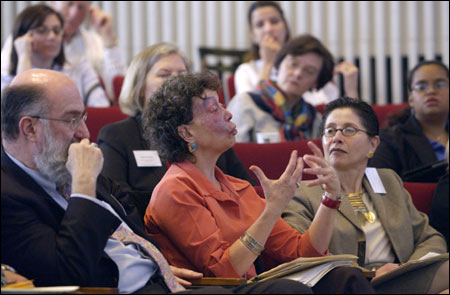Conference looks at benefits to bilingualism
Two is better than one

In remarks that opened a multidisciplinary conference called “Bilingual Benefits” Friday (April 30), Harvard President Lawrence H. Summers stated the truism that it’s always preferable to know more than to know less, and most of us wish we knew more languages than we do.
Why, then, has bilingualism become such a battleground? Referenda quash it; national security demands it while simultaneously making it nearly impossible to attain. “The Hispanic Challenge,” a recent essay by Weatherhead University Professor Samuel P. Huntington, fanned the flames of the controversy by stating that the influx of Hispanic immigrants poses a threat to our national identity.
“Sometimes in education, there are great divides between evidence concerning the effectiveness of one or another instructional strategy and public perceptions and even public policy,” said Ellen Condliffe Lagemann, dean of the Graduate School of Education (GSE) at the conference. “Bilingualism is an example of such a divide.”
“It’s as if all the cartographers told us the world was round, and we continued to plan trips as if the world was flat,” added Doris Sommer, Williams Professor of Romance Languages and Literatures, who convened the “Bilingual Benefits” conference with Nonie Lesaux, assistant professor of education at the GSE. While much of the public debate on bilingualism focuses on – and problematizes – English proficiency, research from a variety of domains finds far-reaching benefits to bilingualism, said the conference organizers. “Keeping your home language and learning the lingua franca promotes personal and public goals,” Sommer added.
Research informing contexts from education and literacy to policy and medicine was at the center of the daylong “Bilingual Benefits” conference, sponsored by the Cultural Agency Initiative of the David Rockefeller Center for Latin American Studies and the Rockefeller Foundation.
The paradoxical approaches to bilingualism set up by Summers and Lagemann in their opening remarks reverberated throughout the day’s talks. Modern Languages Association President Mary Pratt gave an insightful overview of the “Ecology of Language,” noting that the 9/11 terrorist attacks and ensuing wars have brought a new urgency to language acquisition. “Nowhere is concern about languages more intense right now than in government agencies,” she said. “English-only America is facing the fact that English isn’t enough.”
Yet those government agencies have learned that the level of language competency they require – it’s not enough to be able to chat with Grandma, speakers must also be able to discuss a policy article in The Washington Post, she said – make it almost impossible to gain security clearance.
University of Illinois, Chicago, professor Sander Gilman discussed how bilingualism can enrich medical practice. Not knowing someone’s native language or cultural associations can lead to misunderstandings and even overmedication for certain conditions such as anxieties, he said. Knowing more than one language or cultural code – even if it’s not the language of a particular patient – helps medical practitioners ask better questions and provide better treatment.
The power of the research came as little surprise to Lesaux and Sommer, who plan to compile the six presentations into a booklet to distribute to educators and policy-makers. Lesaux’s own research has found that with proper intervention, children who speak English as a second language can learn to read English as well as or even better than their English-speaking peers.
“It doesn’t matter what other language you know,” said Sommer. “The very fact that you can think in more than one code makes you more flexible intellectually, more stable emotionally, more cautious politically.”




